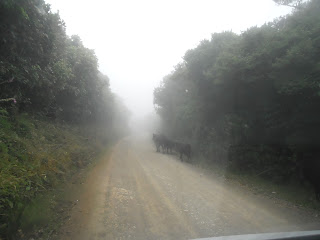 |
| Cattle along the way |
On waking there were more vans in than the night before,
however none jammed up against us as we seem to have endured so often of late.
The skies were low over the Bay but we were optimistic that as the morning
progressed visibly would improve. Alas, we were so wrong. We drove up out of
Elaine Bay and headed north toward French Pass, mainly driving along a high
ridge at first along a wide gravel road bordered with scrub. The map suggested
there were views to be had to the left and right as we passed along narrow
peninsulas, and a couple of narrow tracks led off to the side down into bays
that may well have been picturesque had we been able to see anything. Alas the
cloud was low, swirling about us, sometimes so dense we had mere metres clear
ahead of us, and sometimes a little more. A sign on the roadside warned we
would be passing through farming land where livestock wandered randomly, so we
proceeded with care, coming suddenly upon a small herd of beef cattle fairly nonchalant
about the through traffic.
 |
| View over Anaru from Collinet Point |
After about ten kilometres we crossed a cattle stop and
were suddenly into well managed farmland, and so this continued right through
to the end of the road at French Pass. Much of this land is owned by Te Kuta
Station, who run Angus cattle and sheep on the absurdly steep hills of this spectacular
country, or at least spectacular where it can be seen to be so. I ran a
commentary when glimpses of bays far below the road could be seen, while Chris
concentrated on the very winding road high above the sea level. Soon D’Urville
Island came into view, just across the stretch of water known as French Pass.
While this is part of the seas that make up the Marlborough Sounds, it is more
like a wild tidal river, which allows a narrow pass between the shallow rocky
part reaching out from the island and the mainland. It apparently has the
fastest flows in New Zealand reaching eight knots, and when the tide changes,
the current can be strong enough to stun fish.
 |
| French Pass, D'Urville Island in the distance |
It is here at Collinet Point, above the Pass, that the famous
Pelorous Jack is celebrated by a statue. We stopped here and braved the winds
to look down upon this dangerous section of navigable water.
In 1888, a Risso’s dolphin appeared for the
first time and continued to accompany boast to and from French Pass for the
next twenty four years. He became the first dolphin in the world to receive the
protection of the law, and was last seen in April 1912.
From this view point the road descends steeply into the little
bay on the edge of Admiralty Bay where there is an intimate DOC camp for which forward
booking is essential during the summer months, a wharf and a few houses, most
part of the European farming community that has been here for the past one
hundred and sixty years.
 |
| Hanging about Anaru / French Pass |
Despite
the relative shelter of the bay tucked around the corner from the pass, gusts
still buffetted the motorhome we parked parallel to the beach. We decided to
wait the weather out, sure that the wind would blow the low cloud away by early
afternoon. And so we read and watched the occasional marine traffic, occasionally
rocked by a mighty squall of salt water. By 2 pm, there was little improvement
but we were optimistic that matters would be better once we climbed back up
above sea level. Alas, we were wrong. The cloud was even denser than the
morning’s run in and we crawled back toward Elaine Bay at 20 to 30 kph,
buffetted by dust laden wind, with visability little more than ten metres.
Sheep appeared from nowhere, and oncoming traffic only visible when their
lights were right upon us.
We
pressed on, regaining the sealed road on reaching the turn off to Elaine Bay,
still proceeding with caution, on back past Okiwi Bay back out to the main road,
sixty kilometres from French Pass. By now serious rain had set in and we backed
in beside the river, at this point with only one other camping companion.
However by the time darkness fell there were nearer twenty little whizz-bangs
vans and one other large van, all squeezed in with no regard to the safety
requirement for a three metre gap. A quick exterior inspection of our van
proved it was dirtier than it had ever been in the entire time we have owned
it. Chris is rather upset.




No comments:
Post a Comment